Knowledge Work Gone Adrift in the Information Age
Third Floor, Levis Faculty Center
919 West Illinois Street, Urbana
Knowledge work is conversational and temporal, yet we tend to theorize it with appeals to spatial imagery. Richard Boland challenges the assumption of shared meaning in organizational culture and the dominance of information processing models of organizations and human cognition. He suggests that we can better understand organizations that lack shared meaning among members by appreciating narrative as a mode of cognition and its implications for the construction of self. Boland then develops some implications for studying learning and innovation in organizations and for designing information technologies to support such processes.
The Eighth Daniel Alpert Lecture
Relating the search for new knowledge to the enhancement of public understanding.
Cosponsored by: Office of the Chancellor, Office of the Provost and Vice Chancellor for Academic Affairs, Office of the Vice Chancellor for Research and the Graduate College, Office of the Vice Chancellor for Student Affairs, The Council of Deans, The Center for Advanced Study, George A. Miller Endowment, George A. Miller Committee, Peggy Harris Memorial Fund, Department of Accountancy, Department of Business Administration, Department of Curriculum and Instruction, Department of Educational Policy Studies, Department of Educational Psychology, Department of Electrical and Computer Engineering, Department of Philosophy, Department of Psychology, Department of Sociology, Center for Instructional Research and Curriculum Evaluation (CIRCE), Institute of Government and Public Affairs (IGPA), Office for Information Management, Office of Continuing Education and Public Service, Office of Mathematics, Science and Technooogy Education (MSTE), National Center for Supercomputing Applications (NCSA)
Weatherhead School of Management, Case Western Reserve University

